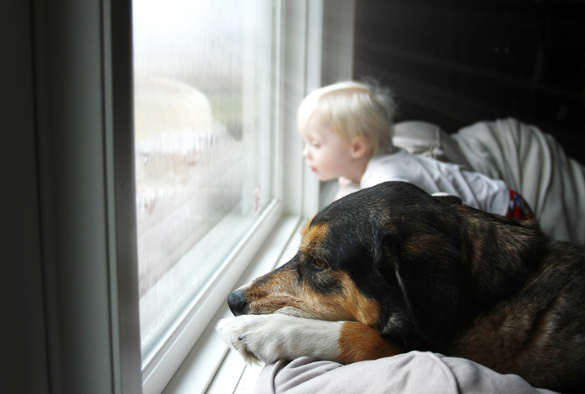
Emergency hospital attendance for dog bites to children was three times higher than expected during the first COVID-19 lockdown, a study has found.
The findings, by the University of Liverpool, Alder Hey Children’s NHS Foundation Trust and Dog’s Trust, suggest that COVID-19 public health measures, such as lockdowns and school closures, may result in increased dog bites to children. The researchers are calling for urgent public health communication and education to help prevent these avoidable injuries.
The study looked at emergency department attendance data from Alder Hey in Liverpool between January 2016 and September 2020.
From May – July 2020, dog bite attendance rose threefold from an average of 15 cases a month (pre-first lockdown) to a peak of 44 cases in July. The proportion of overall emergency department attendances due to dog bites also quadrupled during this period to more than 1 in 100 (1.33%) by July. The victim profile, regarding the age and sex of the child, did not change. Girls and boys were equally as likely to attend, but boys tend to attend at a slightly older age (7-12 years old vs 4-6 years old). By September 2020, case numbers had returned to normal, coincident with schools reopening.
The research concludes that COVID-19 public health measures were associated with an increase in the number of paediatric dog bite emergency department attendances, potentially due to children spending more time at home, with greater exposure to dogs.
First author Dr John Tulloch, a research fellow at the University of Liverpool, said: “Dogs have brought many people much joy and companionship throughout the COVID-19 pandemic. Sadly, our findings suggest that the extended periods of time that children spent at home, during lockdowns and school closures, may have led to a large and worrying number of children attending A&E for dog bites. In the UK we are slowly emerging out of lockdown, but many other countries are still in, or re-entering, national lockdowns. It is likely that in these lockdowns there will unfortunately be an increase in dog bites to children.”
Co-author Dr Matt Rotheram, an emergency consultant at Alder Hey Children’s NHS Foundation Trust, said: “During the first lockdown, there was a large increase in the number of children and young people coming to Alder Hey with dog bites. If you or your child is bitten by a dog, there are simple steps you can follow. If you or your child are seriously injured, call 999 straight away. All bites can become infected so run the bite under warm water, remove any dirt or foreign bodies, encourage the wound to bleed and if bleeding heavily, apply pressure to the wound and cover with a plaster or bandage before getting it seen to by a doctor or nurse. We would encourage you to get all bites, however minor, seen by a health professional as there is always a risk of infection.”
Dog behaviour expert Dr Carri Westgarth, who led the study at the University of Liverpool, said: “Research shows that whilst there are many benefits to owning dogs, such as physical activity and companionship, bites are a public health risk that can not only cause physical injury but be upsetting for the whole family. Any dog can bite and often the signs that they are feeling overwhelmed, like folding their ears back, turning their head away or walking away from a situation, go unnoticed, especially by children. It is important to learn to spot these early warning signs so that potential aggression can be prevented before it escalates.”
Co-author Dr Robert Christley, Deputy Head of Research at Dogs Trust said: “No matter how well behaved your dog is, never leave them alone with your child, carefully monitor their interactions and intervene before worrying situations escalate. If you’re concerned about your dog in public always keep them on a lead and consider muzzling. If you notice any changes in your dog’s behaviour, it’s worth visiting your vet who can check for any underlying causes and help with referring you to a qualified behaviourist.
“Dogs Trust’s Dog School provides dog owners with access to fun, reward-based training. These classes help owners to read their dog’s behaviour and to teach them skills that will enable them to settle in a home environment and cope with day-to-day events. If we can support people so they notice some of the more subtle ways dogs communicate with us, this all contributes to a better bond and fewer behavioural issues.”
The researchers say that further work is now needed to define whether these findings are representative of the national picture and to understand the specific reasons why dog bites increased.
The study is published in the journal BMJ Paediatrics Open.
Research reference:
Tulloch JSP, Minford S, Pimblett V, et al. Paediatric emergency department dog bite attendance during the COVID-19 pandemic: an audit at a tertiary children’s hospital, BMJ Paediatrics Open 2021;5:e001040. doi: 10.1136/bmjpo-2021-001040